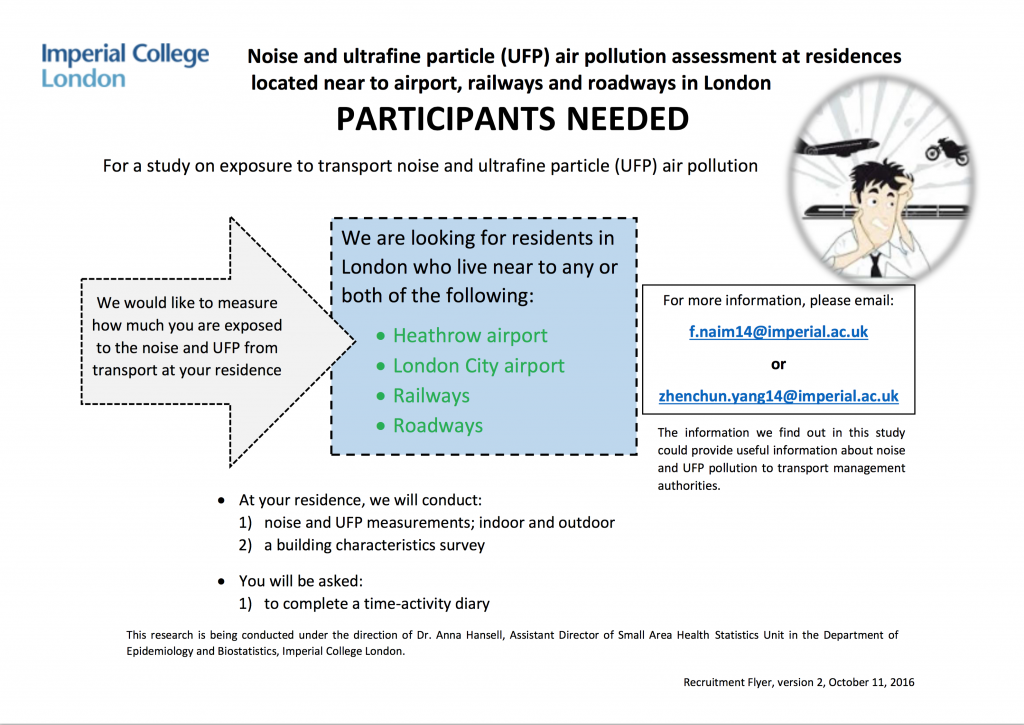Month: November 2016
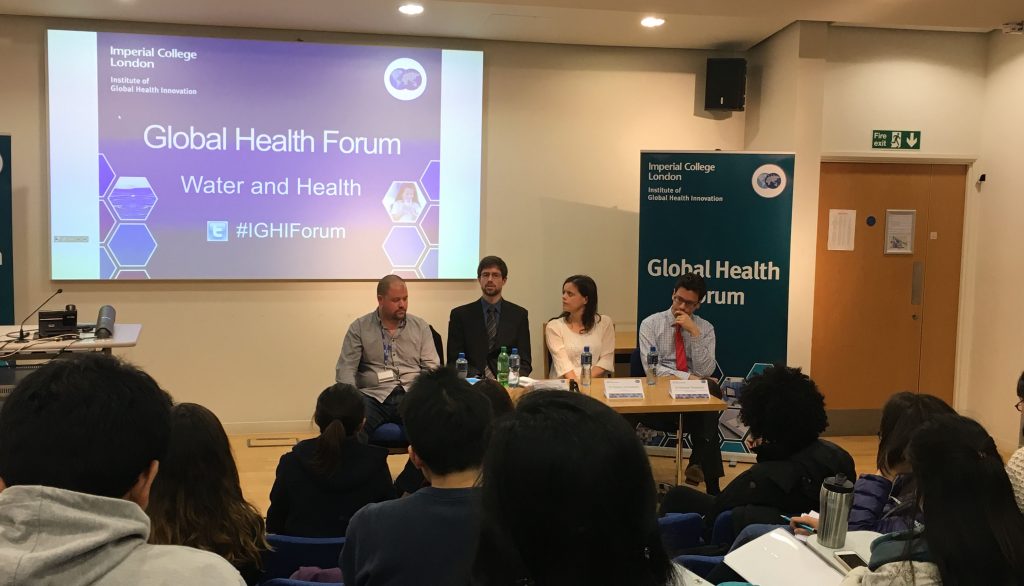
Recent activities
The first Global Health Forum of the year took place on 20 October on Big Data Decision Support. The event discussed big data in medicine and healthcare and the best ways we can use what is available. Watch the full event here.
On 17 November we had our second Global Health Forum focusing on ‘Water and health’. Speakers included Dr Alexander Webb, Simon De Stercke, Dr Pauline Scheelbeek and Dr Michael Templeton covering a range in issues related to water such as salinity in drinking water and sanitation.
Latest IGHI Blog articles
Practitioner and patient-targeted interventions to address excessive antibiotic use
By Dr Olga Kostopoulou, Reader in Medical Decision Making and Professor Brendan Delaney, Chair in Medical Informatics and Decision Making at Imperial College London
Introducing ‘Exosonic’, a new device to combat pancreatic cancer
By Student Challenges Competition 2015/16 Audience Choice Award winners, Antonios Chronopoulos and Tyler Lieberthal
What is the role of social media in health policy?
By Sabine Vuik, Policy Fellow and Head of Analytics, Centre for Health Policy, Institute of Global Health Innovation
By Professor Desmond Johnston, Vice Dean (Education) for the Faculty of Medicine atImperial College London
BIOTOPE (BIOmarkers TO diagnose PnEumonia)
By Dr John O’Donoghue, Senior Lecturer in eHealth & Deputy Director of Imperial’s Global eHealth Unit
Putting TB to the test: My journey so far
By Harriet Gliddon, winner of the IGHI Student Challenges Competition 2015-16
THET Annual Conference – Rethinking International Health Partnerships
By Hamdi Issa, PhD Candidate, Institute of Global Health Innovation
Director for the BDAU interviews the founder of the Open Data Science Conference in London
By Joshua Symons, Policy Fellow, Big Data & Analyitcal Unit, Centre for Health Policy
Write for us
We are always on the lookout for new bloggers. If you would like to write for our blog, please get in touch with the IGHI Communications Manager, Jo, at j.seed@imperial.ac.uk
Nikita Rathod
Communications and Events Assistant
IGHI
Imperial/WHO CC Alumni reunion in Riyadh
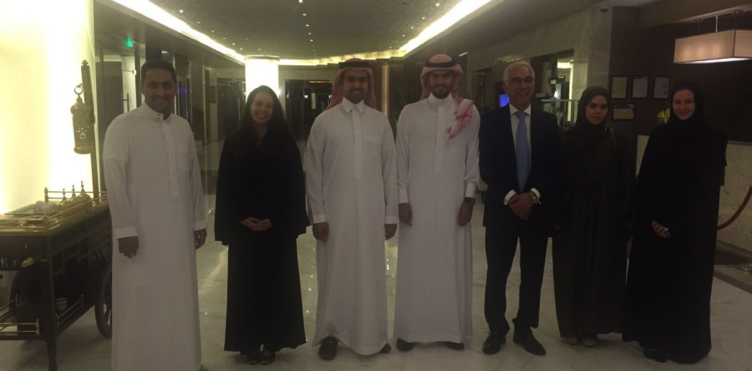 Professor Salman Rawaf hosted a gathering for Imperial MPH and PhD alumni as well as WHO CC Fellowship Alumni currently residing in Riyadh on the 13th October at the Hilton Double Tree in Riyadh. Attending the gathering was DR. Amal Hassanein, Ms Johara Al Saud, DR Turki Bin Moammer, Dr Thamer Al-Ohali, and Dr Ahmed Al Mujil.
Professor Salman Rawaf hosted a gathering for Imperial MPH and PhD alumni as well as WHO CC Fellowship Alumni currently residing in Riyadh on the 13th October at the Hilton Double Tree in Riyadh. Attending the gathering was DR. Amal Hassanein, Ms Johara Al Saud, DR Turki Bin Moammer, Dr Thamer Al-Ohali, and Dr Ahmed Al Mujil.
Visit to King Abdul Aziz University College of Medicine, Jeddah
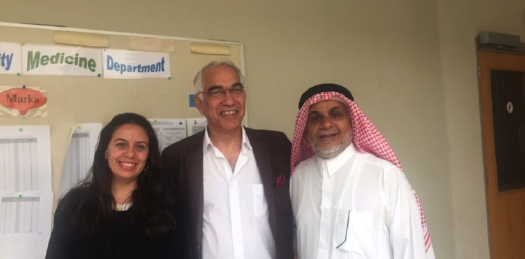
Professor Salman Rawaf and Dr Sondus Hassounah visited the King Abdul Aziz University College of Medicine in Jeddah on 9 October and were hosted by Professor Waleed Melaat to discuss cross university research collaboration.
Focus Group Discussions in Riyadh, Jeddah, Tabuk, Dammam, and Abha
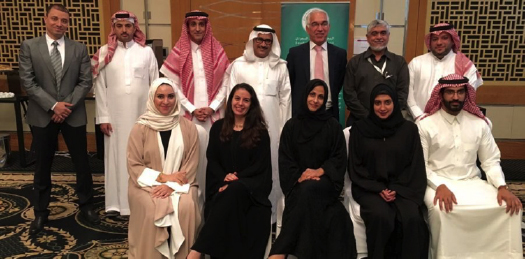 In collaboration with the Saudi Health Council (the coordinating body for the integration between the various health authorities in the Kingdom of Saudi Arabia), Professor Salman Rawaf and Dr Sondus Hassounah conducted five focus group discussions, over a period of two weeks (3 – 14 October), as part of the larger project to develop a national strategy for the development of Health Protection in the Kingdom of Saudi Arabia.
In collaboration with the Saudi Health Council (the coordinating body for the integration between the various health authorities in the Kingdom of Saudi Arabia), Professor Salman Rawaf and Dr Sondus Hassounah conducted five focus group discussions, over a period of two weeks (3 – 14 October), as part of the larger project to develop a national strategy for the development of Health Protection in the Kingdom of Saudi Arabia.
The team from Imperial College London’s WHO Collaborating Centre for Public Health Education and Training(Ms Christina Banks, Ms Alex Swaka, Mr Mohamed Al Saffar, Dr Sondus Hassounah, and Professor Salman Rawaf) have been involved in the project since its inception in early 2016 and have been working with their counter parts in Saudi Arabia on the multi-pronged project which includes a desk review of model country case studies, focus group discussions with relevant stakeholders, a nationally representative survey with 5,500 of the public, and in-depth interviews with policy makers.
The project is expected to continue till mid-2017 when the results will be shared and discussed with the Saudi Health Council and other partners in Saudi Arabia.
Mashael Al Sheikh: Systematic Review on Women and Cardiovascular Risks in KSA
Congratulations to Ms Mashael Al Sheikh, PhD student at the Imperial WHO Collaborating Centre for Public Health Education & Training, for her Systematic Review on Women and Cardiovascular Risks in the Kingdom of Saudi Arabia, which is available for viewing here.
The article has significant public health implications and more results will be available shortly on the impact on culture (beliefs, behaviour etc) on health.
Health policies and family physicians alike should aim to address some of these issues outside the disease model.
Leadership in Health- National Primary Care Services, Kuwait
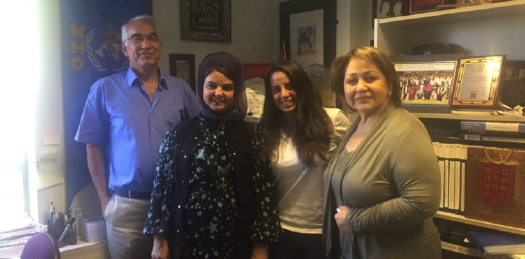 The WHO Collaborating Centre for Public Health Education and Training hosted Dr Rihab Wotayan (Managing Director for the National Primary Care Services in Kuwait) to discuss future collaboration with the centre and the department of Primary care and Public Health at Imperial. Dr Rihab and her team are interested in working with WHO CC to develop the capacity of, and train, their local health workforce, particularly in ‘Leadership in Health’. Dr Rihab is also keen to expand on the success of their recent investment in Primary Care doctors in the Kingdom and potentially send some of Kuwait’s GP trainees to take part in WHO CC 1-2 year post graduate research fellowship.
The WHO Collaborating Centre for Public Health Education and Training hosted Dr Rihab Wotayan (Managing Director for the National Primary Care Services in Kuwait) to discuss future collaboration with the centre and the department of Primary care and Public Health at Imperial. Dr Rihab and her team are interested in working with WHO CC to develop the capacity of, and train, their local health workforce, particularly in ‘Leadership in Health’. Dr Rihab is also keen to expand on the success of their recent investment in Primary Care doctors in the Kingdom and potentially send some of Kuwait’s GP trainees to take part in WHO CC 1-2 year post graduate research fellowship.
For the picture–Left to right: Professor Salman Rawaf (Director WHO CC), Dr Rihab Wotayan (Managing Director for the National Primary Care Services in Kuwait), Dr Sondus Hassounah (Teaching Fellow, WHO CC), Dr Weiam Ahmed (Honorary lecturer WHO CC).
Welcome to WHO CC Post-Graduate fellow Dr Abdulaziz Alqahtani
WHO Collaborating Centre for Public Health Education and Training was joined on 1st October by Dr Abdulaziz Alqahtani from Saudi Arabia. Dr Abdulaziz is a senior Registrar in Family Medicine at the Prince Sultan Military Medical City and will be following his postgraduate fellowship till end of August next year.
Ela Augustyniak
WHO Collaborating Centre for Public Health Education and Training
Students who completed their BSc in the 2015-16 year enjoyed an evening of prize-giving at the Drewe Lecture Theatre, Charing Cross Campus on Wednesday 9 November.
They were competing for the Charles Power Prize (for Best Overall Performance in the BSc), as well as the Evelyn de Rothschild Prize (for Best BSc Project). Three students were in competition for each prize, and each gave a 10-minute presentation on their chosen topic, which was followed with five minutes of questions from a distinguished panel of BSc Pathway Director judges and members of the audience.
Dr Sophie Rutschmann, Dr Mark Sullivan and Professor Barbara Bain were tasked with judging the Charles Power Prize, and awarded First Place to Daniel Ang Jia for his Immunity and Infection presentation entitled, ‘Vaccines: lessons in problem solving with basic science’. Second Place went to Janaki Desai for her Pharmacology-based ‘Do antidepressants actually work?’ presentation. Third Place was awarded to Florence Mouy, for ‘Myocardial Hibernation’ in the field of Cardiovascular Science.
The Evelyn de Rothschild Prize for Best BSc Project was judged by Professor Alison McGregor, Dr Chris John and Professor Louise Donnelly. After the three presentations, it was Sophie Glover who came out on top with First Place for her Neuroscience and Mental Health project, ‘Understanding the mechanisms behind ketogenic diet in gliobastoma multiforme’. A second appearance from Daniel Ang Jia was his project, ‘Immune thrombocytopenia and the MIF surrounding it’, based again in Immunity and Infection, which came in second. This was followed in Third Place by a Reproductive and Developmental Sciences project entitled, ‘The Use of Human Donor Milk in England: A Descriptive Study’ by Rita Marciano Alves Mousinho.
Dorrit Pollard-Davey
Curriculum Assistant (Educational Quality)
Imperial College School of Medicine
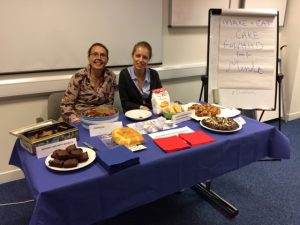 To mark the World Mental Health Day on Monday October 10, Federica Amati and Pirkko Carmack organised a charity cake sale on Wednesday 12 October at 12.00 in our seminar room, to raise money for Mind mental health charity. We managed to raise £151.60 which was a great result.
To mark the World Mental Health Day on Monday October 10, Federica Amati and Pirkko Carmack organised a charity cake sale on Wednesday 12 October at 12.00 in our seminar room, to raise money for Mind mental health charity. We managed to raise £151.60 which was a great result.
It was also a very sweet start to our departmental meeting for a great cause, and also an occasion to remember to look after our own mental health.
We also reminded to Take 10 Minutes and focus on the importance of Mental Health.
Stand Up To Cancer
The SiMMS group within the Centre for Engagement and Simulation Science (ICCESS) had an important role in Channel 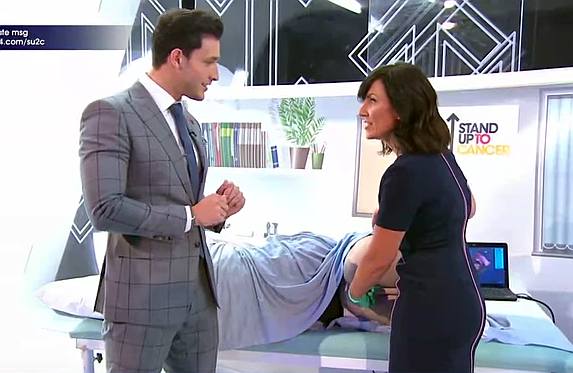 4’s Stand Up To Cancer telethon on Friday 14 October. The annual live TV event is a partnership between C4 and Cancer Research UK and features stars from film, music and television. The production company behind the 2016 event approached ICCESS after seeing recent media publicity about the Centre’s pioneering haptic device for rectal examinations.
4’s Stand Up To Cancer telethon on Friday 14 October. The annual live TV event is a partnership between C4 and Cancer Research UK and features stars from film, music and television. The production company behind the 2016 event approached ICCESS after seeing recent media publicity about the Centre’s pioneering haptic device for rectal examinations.
Members of the team, led by Centre Director Dr Fernando Bello, duly took part in rehearsals and filming, setting up the device for TV presenter Davina McCall to get a lesson in direct rectal examination (DRE) from Dr Mike live on television!
The inclusion of the robotic rectum in the show helped make an important point. Embarrassment about rectal examination can be one reason why some men don’t visit the doctor even if they have symptoms that are indicative of prostate cancer. The SiMMS group are keen to explore ways in which their device can be used to help educate patients on the importance of rectal examination – and why it’s not worth dying of embarrassment.
Here’s a clip of Davina performing her first rectal examination…albeit on the robotic rectum: http://bit.ly/2gEzyf7
Wellcome Saturday Studio
A team of researchers, clinicians and educators from ICCESS delivered a highly successful workshop at the Wellcome Collection on Saturday 29 October. ‘Saturday Studio’ is a series of drop-in workshops for people aged 14-19 inspired by the Wellcome Collection and led by experts from a range of disciplines. The ICCESS team, led by Prof Roger Kneebone, delivered a hands-on session that explored the skills of surgery from an unusual perspective.
The three themes of the workshop covered some of the skills fundamental to surgery
- Joining and sewing, led by lacemaker Fleur Oakes, demonstrated how delicate stitching and handiwork is key to many surgical procedures
- Working in teams, featuring puppeteer and theatre director Rachel Warr, showed how puppets are moved and manipulated by several people working in tandem, highlighting the importance of collaboration in the operating theatre
- Teaching your fingers to see, led by ICCESS researcher Dr Alejandro Granados, taught guests how the sense of touch is vitally important to clinicians when performing internal examinations
The event was extremely popular and received a great deal of positive feedback from the young people who attended, and the ICCESS team are hoping to go back to deliver another such session in future.
For more information about the Wellcome Collection Saturday Studio visit
https://wellcomecollection.org/saturdaystudio
Duncan Boak
Centre Manager
Imperial College Centre for Engagement and Simulation Science (ICCESS)
The e-learning team in collaboration with the Pharmacology BSc won the prestigious Brandon Hall Silver Award in the “Best Results of a Learning Program” category for their e-learning modules, which are delivered to the Medical and Biomedical Science students opting for the Pharmacology BSc pathway.
The design of the e-learning modules was initiated strategically using the Blended Learning Design Tool (BLEnDT©), which identifies the learning outcomes that lend themselves to interactive self-guided online learning, following an Instructionist approach. The tool also identifies the learning outcomes that are best suited for face-to-face delivery or online delivery following a Constructivist/Collaborative approach.
The animations in the e-learning modules were creatively designed to have a bit of a 3D feel (see screenshots). The lower-order learning objectives (such as recall and list) were covered within e-learning modules, giving face-to-face teaching the scope to focus on the higher-order learning objectives (e.g. critical thinking, evaluation). The impact of this e-module on student engagement has also recently been published (BMC Medical Education (2016) 16:195).

Students’ comments
“because we had already been exposed to it [the receptors] before in the e-course, when we went over it again it was much easier to understand”
“the most efficient approach is to have the eLearning beforehand and then you have a contingency tutorial to check or to ask any questions or to briefly skim over it”
“so often you turn up to a lecture and they jump in so far beyond your knowledge… And you can’t ask effective questions because you don’t know the fundamentals to start with”
Team Members:
- E-learning – Akram Ameen, Taylor Bennie, Ashish Hemani, Maria Toro-Troconis, Lisa Carrier
- Pharmacology BSc – Sohag Saleh, Chris John
Contact – elearning.medicine@imperial.ac.uk
Ashish Hemani
eLearning Programme Manager
Faculty Education Office (Medicine)

